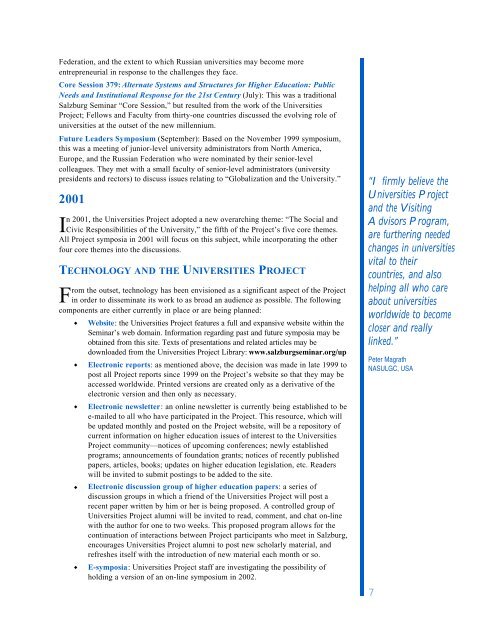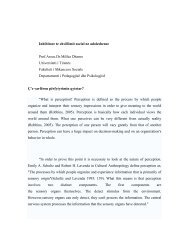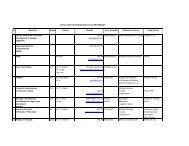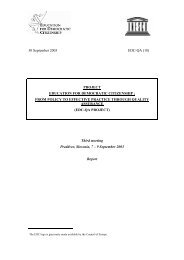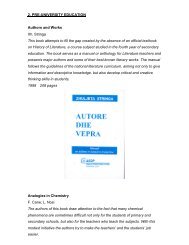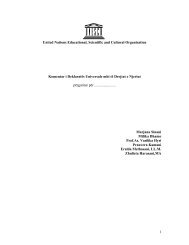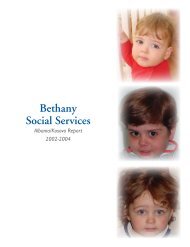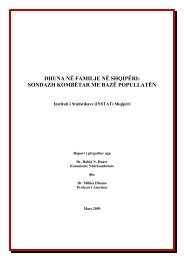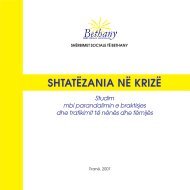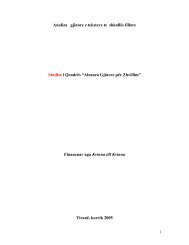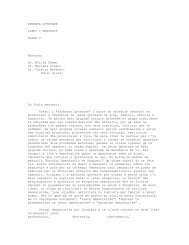Salzburg Seminar â Universities Project - Milika Dhamo
Salzburg Seminar â Universities Project - Milika Dhamo
Salzburg Seminar â Universities Project - Milika Dhamo
You also want an ePaper? Increase the reach of your titles
YUMPU automatically turns print PDFs into web optimized ePapers that Google loves.
Federation, and the extent to which Russian universities may become more<br />
entrepreneurial in response to the challenges they face.<br />
Core Session 379: Alternate Systems and Structures for Higher Education: Public<br />
Needs and Institutional Response for the 21st Century (July): This was a traditional<br />
<strong>Salzburg</strong> <strong>Seminar</strong> “Core Session,” but resulted from the work of the <strong>Universities</strong><br />
<strong>Project</strong>; Fellows and Faculty from thirty-one countries discussed the evolving role of<br />
universities at the outset of the new millennium.<br />
Future Leaders Symposium (September): Based on the November 1999 symposium,<br />
this was a meeting of junior-level university administrators from North America,<br />
Europe, and the Russian Federation who were nominated by their senior-level<br />
colleagues. They met with a small faculty of senior-level administrators (university<br />
presidents and rectors) to discuss issues relating to “Globalization and the University.”<br />
2001<br />
In 2001, the <strong>Universities</strong> <strong>Project</strong> adopted a new overarching theme: “The Social and<br />
Civic Responsibilities of the University,” the fifth of the <strong>Project</strong>’s five core themes.<br />
All <strong>Project</strong> symposia in 2001 will focus on this subject, while incorporating the other<br />
four core themes into the discussions.<br />
TECHNOLOGY AND THE UNIVERSITIES PROJECT<br />
From the outset, technology has been envisioned as a significant aspect of the <strong>Project</strong><br />
in order to disseminate its work to as broad an audience as possible. The following<br />
components are either currently in place or are being planned:<br />
• Website: the <strong>Universities</strong> <strong>Project</strong> features a full and expansive website within the<br />
<strong>Seminar</strong>’s web domain. Information regarding past and future symposia may be<br />
obtained from this site. Texts of presentations and related articles may be<br />
downloaded from the <strong>Universities</strong> <strong>Project</strong> Library: www.salzburgseminar.org/up<br />
• Electronic reports: as mentioned above, the decision was made in late 1999 to<br />
post all <strong>Project</strong> reports since 1999 on the <strong>Project</strong>’s website so that they may be<br />
accessed worldwide. Printed versions are created only as a derivative of the<br />
electronic version and then only as necessary.<br />
• Electronic newsletter: an online newsletter is currently being established to be<br />
e-mailed to all who have participated in the <strong>Project</strong>. This resource, which will<br />
be updated monthly and posted on the <strong>Project</strong> website, will be a repository of<br />
current information on higher education issues of interest to the <strong>Universities</strong><br />
<strong>Project</strong> community—notices of upcoming conferences; newly established<br />
programs; announcements of foundation grants; notices of recently published<br />
papers, articles, books; updates on higher education legislation, etc. Readers<br />
will be invited to submit postings to be added to the site.<br />
• Electronic discussion group of higher education papers: a series of<br />
discussion groups in which a friend of the <strong>Universities</strong> <strong>Project</strong> will post a<br />
recent paper written by him or her is being proposed. A controlled group of<br />
<strong>Universities</strong> <strong>Project</strong> alumni will be invited to read, comment, and chat on-line<br />
with the author for one to two weeks. This proposed program allows for the<br />
continuation of interactions between <strong>Project</strong> participants who meet in <strong>Salzburg</strong>,<br />
encourages <strong>Universities</strong> <strong>Project</strong> alumni to post new scholarly material, and<br />
refreshes itself with the introduction of new material each month or so.<br />
• E-symposia: <strong>Universities</strong> <strong>Project</strong> staff are investigating the possibility of<br />
holding a version of an on-line symposium in 2002.<br />
“I firmly believe the<br />
<strong>Universities</strong> <strong>Project</strong><br />
and the Visiting<br />
Advisors Program,<br />
are furthering needed<br />
changes in universities<br />
vital to their<br />
countries, and also<br />
helping all who care<br />
about universities<br />
worldwide to become<br />
closer and really<br />
linked.”<br />
Peter Magrath<br />
NASULGC, USA<br />
7


